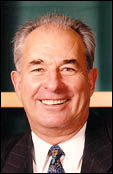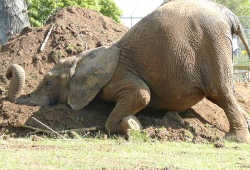Dorothy – 21/1/00
|
|
| Don McKinnon Photo source New Zealand National Party |
Every time Don McKinnon gets a little closer to his dream, a new obstacle somehow gets in the way.
Not that he’s complaining. The latest “obstacle” is his election as Commonwealth Secretary General, a position he takes up in April in London.
Mr McKinnon’s life has taken a completely different path from the one he planned for himself in his teens.
“While I was at school in Nelson and then Washington, all I wanted was to own a farm. I still want that farm! When I graduated from college in the US, the first job I had was as a cowboy in Montana. I loved working on the land, with the horses, out in the open. City life didn’t hold much appeal for me.”
It was as the oldest child of the former army Chief of Gneral Staff Major General Walter McKinnon that Mr Don McKinnon had early experiences outside New Zealand.
Early career in farming and community work On his return to New Zealand when his father’s posting in Washington ended, Mr McKinnon went to Lincoln College. After a period in real estate and farm consultancy, he became involved in community groups and that’s where he first strayed from the path that may have taken him onto the land.
“I got involved in groups like Jaycees. I also set up a debating group at Paremoremo Prison. Eventually it led to people suggesting I get involved in politics and after two attempts, I was elected to Parliament in 1978.”
Political career The rest is history. From 1978, Mr McKinnon continuously held elected office in the National Party and its caucus including the positions of chief whip, Leader of the House, Deputy Leader, and in government from 1990, Deputy Prime Minister, Minister of Pacific Island Affairs, Minister of War Veterans, Minister of Disarmament and Arms Control and Minister of Foreign Affairs and Trade.
The Foreign Affairs portfolio held many challenges and brought many personal and professional achievements including New Zealand’s period on the United Nations Security Council, the establishment of the Asia 2000 Foundation, the Focus Latin America programme, and a critical role in the peace settlement for Bougainville.
Involvement in Bougainville For the McKinnon family there was an earlier link with Bougainville as his father was stationed there when the New Zealand Armed Forces fought the Japanese on the island in 1943. As he grew up Mr McKinnon was influenced by the values of his parents. His mother was a warm and caring person who readily helped people with problems. With his role in the military his father was ready to take responsibility in times of trouble. When Mr McKinnon visited the island of Bougainville in 1991 as Minister of Foreign Affairs and saw for himself the devastation and the suffering, like his parents he took action, and after long and patient negotiation he can take satisfaction from having brokered peace on the island.
International recognition While never seeking the limelight, Mr McKinnon’s achievements as Minister of Foreign Affairs were noted by colleagues throughout the Commonwealth. With
the imminent retirement of the incumbent, a number of Commonwealth leaders asked Mr McKinnon to put his name forward for the job. After more than two years campaigning, Mr McKinnon was unanimously elected by the Heads of Government in Durban in November.
Throughout the summer holiday period and parliamentary recess, Mr McKinnon has been trying to juggle a little time off with his wife and 22 month old son, with the planning and preparation for the move to London.
“I know a lot about the Commonwealth through my time as Foreign Minister especially as deputy chairman of CMAG, the group of ministers tasked with monitoring human rights issues and democratic developments. But since Durban, I have been doing a lot of reading and I’m surprised and impressed with how far the Commonwealth’s tentacles spread.”
“One of my talks as Secretary General will be to try to ensure Commonwealth citizens know about these things. Any organisation needs the support of its members to do its best and to grow. That is a priority.”
Role of small island nations Coming from a relatively small island nation, Mr McKinnon says he also intends ensuring that small island states are able to make a more effective contribution to Commonwealth affairs.
“They have special economic and social factors to contend with. I’ve worked with many Pacific Island and Caribbean leaders and I know it can be hard to have your voice heard among the clamour of larger nations.”
“There are problems specific to small island states. For example, American trade politics have profound implications for the Caribbean banana trade. Greenhouse gas emissions are a major issue for low-lying island states.
Problems in Africa “In the African continent, countries are wrestling with seemingly insurmountable challenges arising from the HIV Aids epidemic, their trade into first world nations is pretty limited and poverty is widespread. If the Commonwealth can make a difference in these areas, and I think it can, then I am determined we will help.
Looking to the future On a personal level, Mr McKinnon says that after 21 years in Parliament, nine of them as a minister, it is time to move on to new challenges, even if it means leaving New Zealand for the better part of the next decade.
“The job will test all my political skills and know how. It’s a challenge but I am looking forward to it.”
And while the daily routine of life in London will be different in many ways, Mr McKinnon says he’ll still fit in a 12 km run three times a week. From April, it’ll be round Hyde Park, not Orewa beach or the Wellington waterfront. And during those runs, he’ll still be planning for the day he can get back on the land on his own farm.




